Are you planning to travel to the Philippines and looking for the essential highlights and travel tips? Delve into our informative guide that sheds light on the must-visit destinations, from the vibrant streets of Manila to the serene beaches of Palawan, and offers practical advice for a smooth trip. Discover what the Travelling to Philippines has in store for you, from culinary treasures to more adventurous activities here, and learn how to navigate this captivating archipelago like a local.
Essential Discoveries
The Philippines is a diverse country with over 7,000 islands offering a mix of urban buzz, historical sites, and natural beauty, perfect for different travel preferences.
Top destinations include Manila’s cosmopolitan atmosphere, Cebu’s historic charm, Palawan’s natural paradise, and other unique spots like Boracay, Bohol, Baguio, Siargao, and the Banaue Rice Terraces.
When traveling to the Philippines, it’s important to be aware of the currency, transportation options, accommodation variety, local customs, and safety tips to ensure a satisfying and respectful journey.
Table of Contents
Plane Ticket Booked to the Philippines: Now What to Expect?
The Philippines offers an unmatched array of experiences for all types of trips, from the thrill of surfing and freediving to the tranquility of relaxation and the historical allure of exploring old towns and churches. It’s a place where adventure meets serenity, making island hopping more than just an activity—it’s a way of life. This archipelago distinguishes itself not only through its diverse attractions but also through its rich culture and the warm hospitality of its people, ensuring every visitor feels instantly welcomed.
With a history spanning thousands of years, the Philippines presents a vibrant blend of the ancient and the contemporary. From bustling cities where colonial architecture stands alongside modern skyscrapers to quaint towns that preserve age-old traditions, the country is a living testament to its past while continuously evolving. The amiable locals and the fusion of traditional and contemporary influences make the Philippines a truly unique and captivating destination for various types of trips.
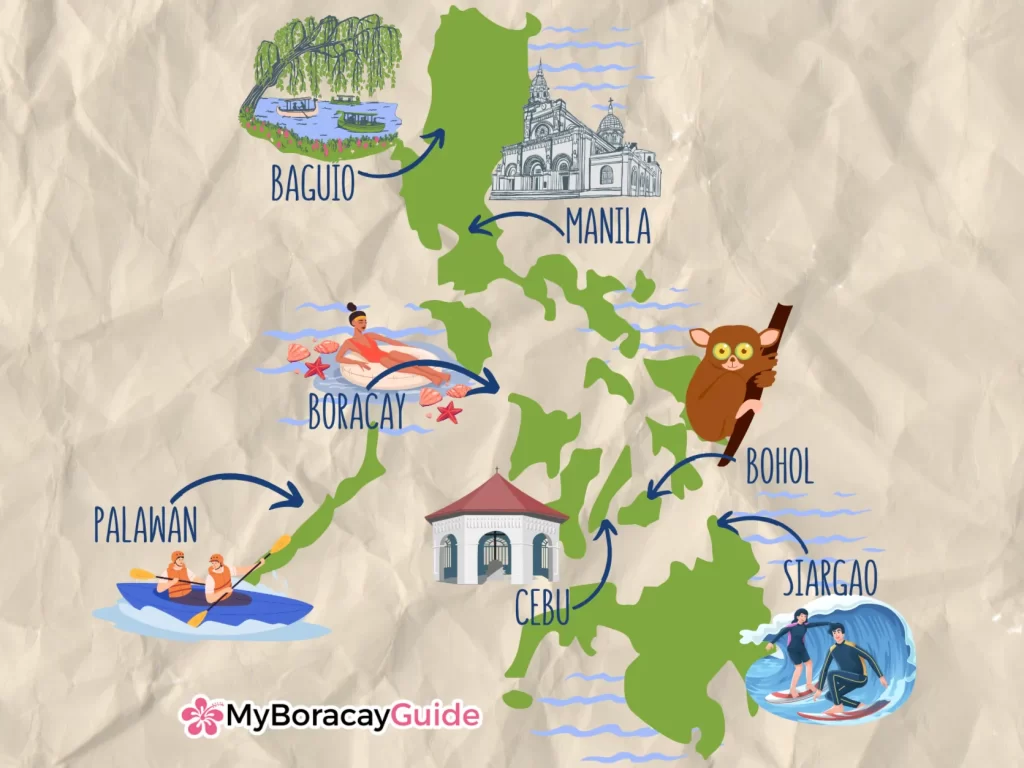
Top Destinations in the Philippines
The Philippines consists of more than 7,000 islands, each one offering its unique attractions and experiences. From bustling cities to tranquil beaches, there’s something for everyone in this tropical country.
If a trip to the Philippines is on your horizon, you might be pondering over the must-visit locales. Well, the answer is simple – everywhere! But if you’re short on time, or just want to make sure you hit all the popular destinations, then read on. We’ve put together a list of the top destinations in the Philippines that you won’t want to miss.
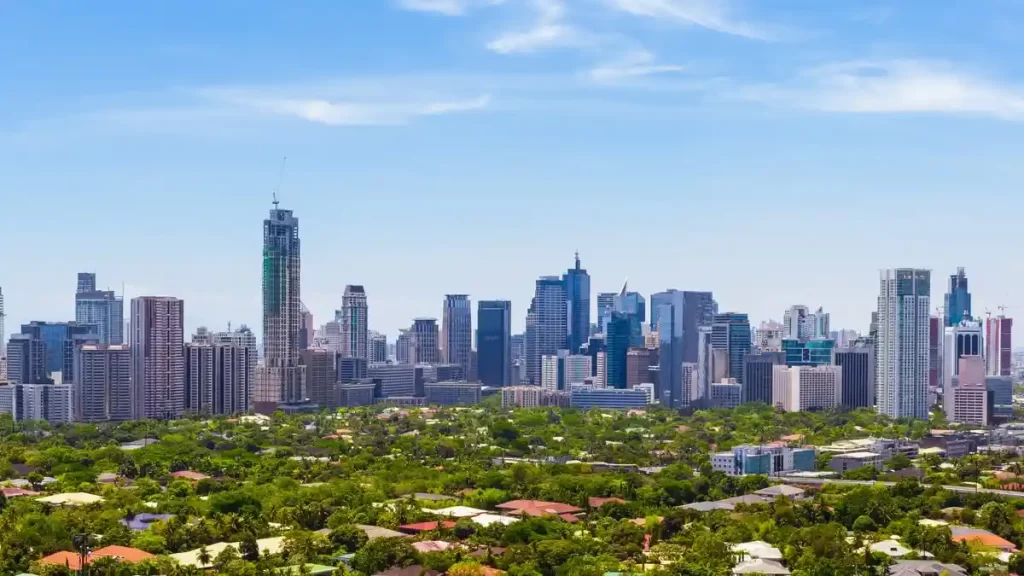
Manila, the bustling capital of the country, frequently serves as the initial pit-stop for travelers arriving at Manila Airport. Known for its rich history, bustling city life, and vibrant nightlife, there’s no shortage of things to see and do here.
From the historic San Agustin Church and Manila Cathedral to the bustling shopping malls of Robinsons Place and SM City Manila, the city offers a unique blend of old and new. When the sun sets, the city comes alive with a thrilling nightlife scene that caters to all tastes and preferences, not unlike the vibrant atmosphere found in Davao City. To continue your adventure to Boracay’s pristine shores, check our blog on navigating from Manila to Boracay for all the essential travel tips and insights.

Cebu, at the heart of the Philippines, seamlessly blends its stunning natural wonders with a deep cultural heritage, epitomized by the vibrant Cebu City. As a nexus of historical richness and modern innovation, the city offers a unique journey through nature’s beauty and human ingenuity.
Famous Places to Visit in Cebu City:
The Basilica Del Santo Niño: This revered site, a cornerstone of Philippine Christianity, is home to the country’s oldest religious relic, offering visitors a deep dive into spiritual history within its ancient walls.
Cebu Taoist Temple: Nestled in the hills, this temple provides a peaceful retreat with its detailed architecture and sweeping views over Cebu, inviting a moment of tranquility and reflection.
Kawasan Falls: Known for its vibrant turquoise waters and peaceful natural pools, Kawasan Falls is an adventurer’s paradise, perfect for those seeking a tranquil escape into nature.
Paradise Beach and Basdaku White Beach: These secluded beaches boast unspoiled white sands and clear waters, offering serene spots for ultimate relaxation away from the crowds.
Explore Beyond Cebu City:
Moalboal: Renowned for its spectacular sardine runs and vibrant coral reefs, Moalboal is a diving and snorkeling haven, providing an underwater spectacle unlike any other.
Malapascua: Famous for its thresher shark diving, Malapascua offers an unparalleled opportunity to dive with these majestic creatures, alongside pristine beaches ideal for relaxation after a day under the sea.
Oslob: Best known for its whale shark encounters, Oslob allows visitors to swim alongside these gentle giants, offering a once-in-a-lifetime experience in the crystal-clear waters of the Philippines.
Cebu offers a rich tapestry of experiences, from the historical allure of Cebu City to the breathtaking natural beauty of Moalboal, Malapascua, and Oslob. If you’re planning a transition from the stunning shores of Boracay to explore Cebu’s diverse attractions, our blog provides comprehensive insights for a smooth journey. For details on how to get to Boracay from Cebu, make sure to check our blog for all the necessary travel tips and information.
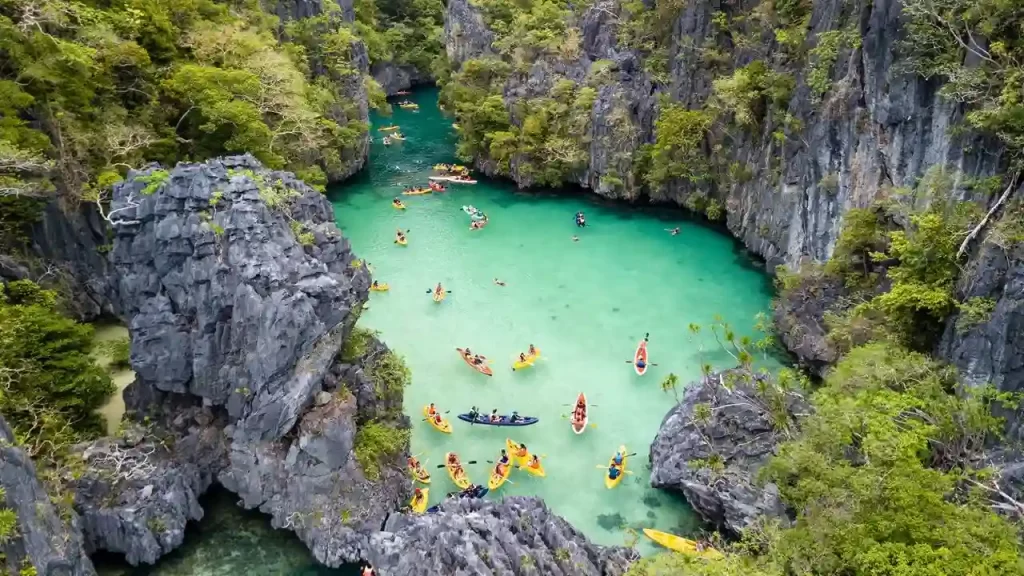
Palawan: Island Paradise
Palawan stands as an epitome of island paradise, inviting those in search of an unmatched island escapade. With Puerto Princesa serving as the main gateway, this island sanctuary unveils hidden treasures, from its dazzling white sand beaches and crystal-clear waters to a vibrant underwater world teeming with life. It’s a haven for beachgoers and nature enthusiasts alike, offering unforgettable moments amidst breathtaking natural beauty.
El Nido
El Nido, a jewel of Palawan, captivates with its majestic limestone cliffs, azure waters, and rich coral reefs. A paradise for divers, climbers, and adventurers, it boasts a plethora of islands and lagoons ripe for discovery. El Nido’s natural beauty offers unparalleled opportunities for exploration, ensuring every visit is filled with adventure.
Coron
Coron, another of Palawan’s treasures, is renowned for its historic shipwrecks and the mesmerizing Lake Kayangan, celebrated as one of Asia’s cleanest lakes. With its unique blend of freshwater and saltwater, Coron is a haven for history enthusiasts and scuba divers, presenting a rich tapestry of natural and historical wonders.
Puerto Princesa
Beyond the allure of its coastlines, Palawan is home to the Puerto Princesa Underground River and Tubbataha Reef, both UNESCO World Heritage sites acclaimed for their extraordinary biodiversity. These sites exemplify Palawan’s commitment to conservation, offering a sanctuary for a diverse range of marine life and adventurers.
Palawan shines not only for its breathtaking landscapes but also as a pioneer in eco-tourism. Embracing sustainable practices, including eco-resorts and community-led tours, Palawan is at the forefront of nurturing tourism that harmonizes with nature and supports local livelihoods. From snorkeling in the pristine waters of El Nido to exploring Coron’s rich history, or simply savoring the peace of its shores, Palawan offers unforgettable and insightful experiences. These adventures not only leave lasting memories but also impart the significance of conserving our natural world and promoting responsible tourism. If you’re considering a journey from El Nido to Boracay, be sure to consult our blog for all the essential information.
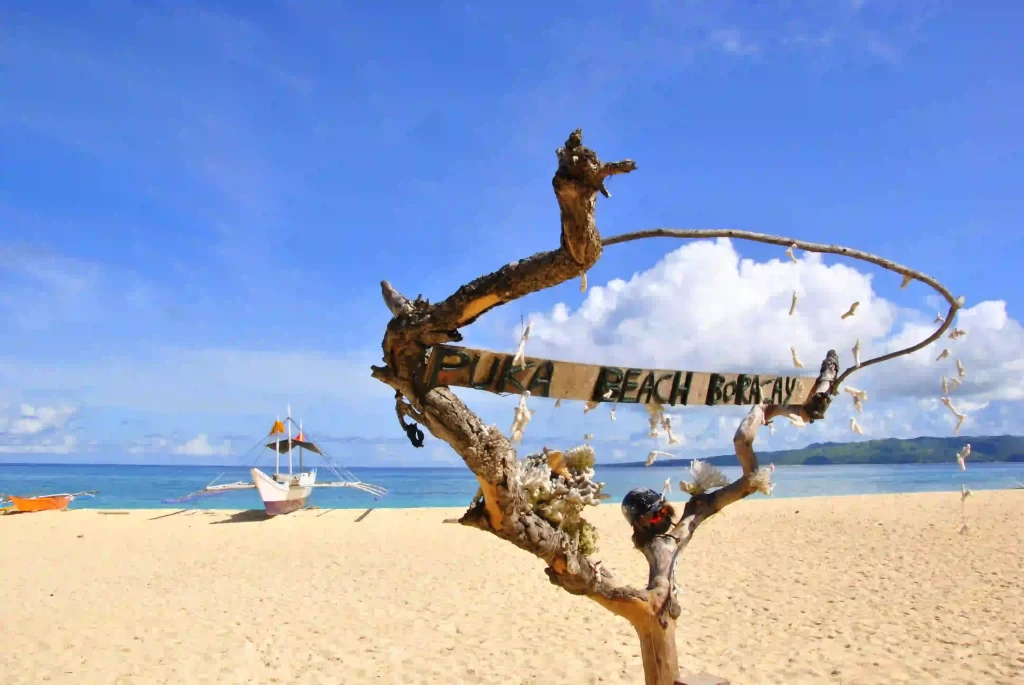
Boracay: Tropical Beach Getaway
Boracay, a quintessential island paradise, is renowned for its fine, white sand beaches and clear azure waters, offering an idyllic setting for a tropical getaway.
The island caters to every budget with a variety of accommodations, ranging from luxurious resorts to cozy guesthouses. As night falls, Boracay transforms into a lively hub, buzzing with an array of nightlife options for endless entertainment.
Culinary adventurers will delight in Boracay’s diverse food scene, featuring everything from casual beachside grills to sophisticated dining establishments. Savor the richness of Filipino cuisine with classics like adobo and sinigang or venture into international flavors against the backdrop of Boracay’s breathtaking views.
Water sports enthusiasts will find Boracay’s Bulabog Beach an unrivaled destination for kite surfing, especially from November to April when the Amihan winds create ideal conditions. Here’s a brief list of water activities to try in Boracay:
Kite Surfing: Experience the thrill of kite surfing at Bulabog Beach, where the Amihan winds provide perfect conditions for this exhilarating sport.
Snorkeling: Explore Boracay’s vibrant underwater world, home to colorful coral reefs and a variety of marine life.
Stand-Up Paddleboarding: Enjoy a leisurely paddle over crystal-clear waters, a peaceful way to take in the island’s stunning scenery.
Parasailing: Get a bird’s eye view of the island’s breathtaking beauty while soaring over the sea.
Scuba Diving: Dive into Boracay’s depths to discover an enchanting underwater landscape teeming with life.
Boracay not only promises a serene beach escape but also a lively atmosphere for making connections with fellow travelers, adding a unique charm to its array of attractions.
Bohol: Chocolate Hills and Tarsier Sanctuary
Bohol stands out as a premier destination in the Philippines, celebrated for its distinctive natural attractions, rich history, and vibrant culture. This island not only captivates with its landscapes but also enchants with its heritage and festivals.

Here’s a quick guide to places to visit in Bohol:
Chocolate Hills: Marvel at the iconic Chocolate Hills, an extraordinary geological formation of over 1,200 perfectly shaped hills that turn brown in the dry season.
Tarsier Sanctuary: Visit the Tarsier Sanctuary to get up close with one of the world’s smallest primates in their natural habitat.
Heritage Sites: Explore Bohol’s rich history through its numerous heritage sites, offering insights into the island’s past and cultural legacy.
Panglao Island: Experience the pristine white sands and crystal-clear waters of Panglao Island, a serene beach destination that rivals the beauty of Boracay.
Whether it’s the awe-inspiring natural wonders, the deep dive into cultural heritage, or the tranquil beach escapes, Bohol promises a journey filled with memorable experiences.
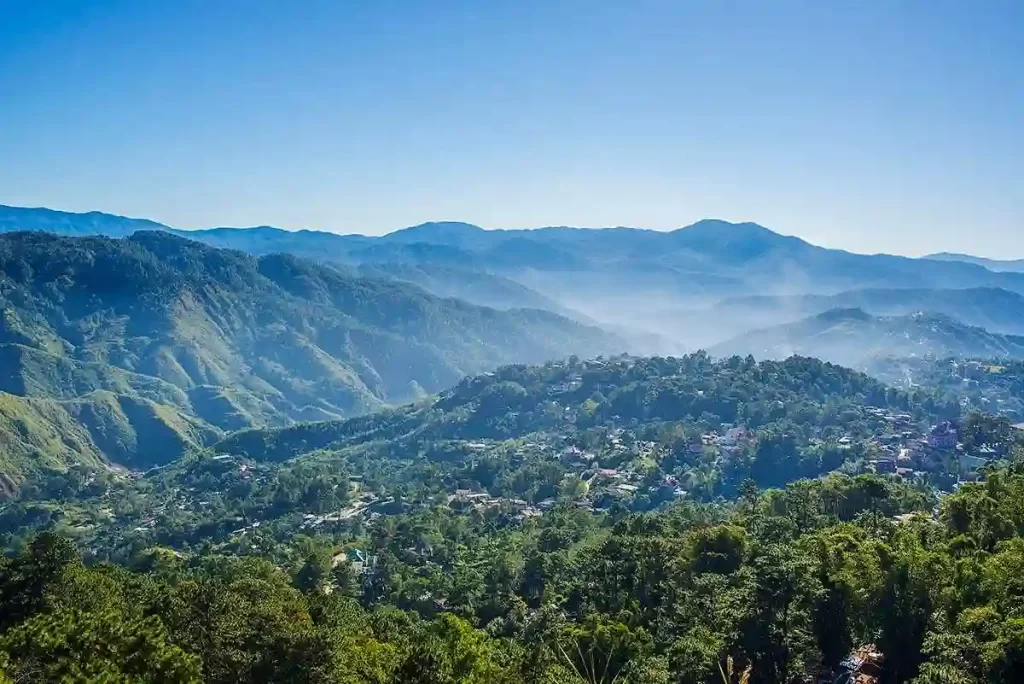
Baguio: Mountain Oasis
Baguio, the Philippines’ cherished ‘summer capital,’ is a haven for those seeking respite from the country’s tropical climate. Its cooler weather and verdant surroundings are ideal for a variety of activities.
Key places to visit in Baguio include:
Burnham Park: Enjoy leisurely boat rides, biking, and picnics in this central park that serves as the city’s heart.
Mines View Park: Offers panoramic views of Benguet’s gold and copper mines and the Cordillera mountains.
Session Road: Dive into Baguio’s vibrant culinary scene with its array of cafes, restaurants, and bakeries.
Transitioning to Banaue, celebrated for its stunning Rice Terraces, often referred to as the “Eighth Wonder of the World.” This destination highlights the ingenuity of the Ifugao people through its ancient terraces.
Highlights in Banaue include:
Banaue Rice Terraces: Marvel at the extensive ancient terraces, carved into the mountains, offering breathtaking landscapes and a peek into centuries-old farming practices.
Hiking Trails: Engage in immersive treks that not only provide majestic views but also a deeper understanding of the local culture and way of life.
Both Baguio and Banaue offer unique experiences, from urban exploration and cultural immersion to natural wonders and scenic beauty, making them unforgettable stops on any Philippine adventure.
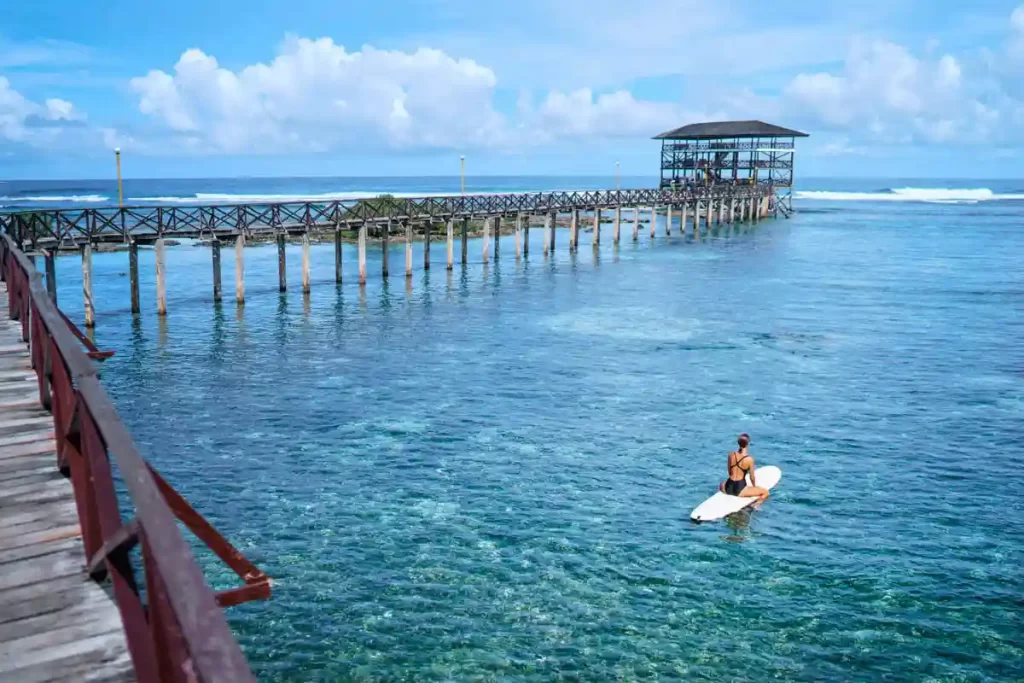
Siargao: Surfer's Paradise
Siargao, dubbed the “Surfing Capital of the Philippines,” is a haven for surfers thanks to its superb surf spots, including the renowned Cloud 9, which is celebrated for its towering, perfect waves.
Famous attractions in Siargao include:
Cloud 9: Catch world-class waves or enjoy the view from the iconic boardwalk that extends over the sea.
Sohoton Caves: Venture into the mystical Sohoton Caves for an adventure through natural limestone formations and crystal-clear lagoons.
Island Hopping: Explore the beauty of Daku, Guyam, and Naked Islands, each offering unique landscapes from powdery white beaches to crystal-clear waters.
Siargao isn’t just for surfing; its idyllic beaches, clear waters, and laid-back atmosphere, coupled with vibrant nightlife and beach parties, provide a perfect blend of excitement and tranquility for all types of travelers.
UNESCO World Heritage Site in the Philippines
The Philippines boasts a collection of UNESCO World Heritage Sites that highlight its cultural richness and stunning natural beauty. Notable sites include Vigan, a well-preserved Spanish colonial town; the Baroque Churches, like San Agustin Church in Manila, which merge European design with local styles; and natural marvels such as the Puerto Princesa Subterranean River National Park and the ancient Rice Terraces of the Philippine Cordilleras. These sites not only draw global travelers but also underscore the Philippines’ dedication to safeguarding its heritage.
Major Cities of the Philippines: Hubs of Culture, Commerce, and Natural Beauty
Manila, the capital, is a bustling metropolis where history and modernity intertwine, featuring ancient landmarks alongside towering skyscrapers. Cebu City, the “Queen City of the South,” merges historical sites with stunning natural vistas, serving as a gateway to the Visayas region’s renowned shorelines and cultural festivities.
Davao City, celebrated for its multicultural atmosphere, and environmental conservation, and as the home of Mount Apo, offers a seamless blend of urban living and natural beauty. Baguio City, known as the country’s summer retreat, is famed for its cool climate, scenic landscapes, and lush gardens.
Iloilo City, gaining recognition for its culinary scene and historical architecture, showcases Spanish colonial buildings and contemporary urban planning with its renowned Calle Real and the Iloilo River Esplanade.
These cities are not merely economic hubs but also custodians of cultural heritage and natural splendors, showcasing the distinctive identity and diversity of their regions.
Exploring the Pristine White Sand Beaches of the Philippines
The Philippines is celebrated for its breathtaking white sand beaches, crystal blue waters, and vibrant aquatic life, serving as a perfect retreat for beach lovers and diving enthusiasts. Among its renowned beach destinations, Boracay shines as a global favorite, known for its fine sand, turquoise seas, and spectacular sunsets.
But the allure of Philippine beaches extends beyond Boracay. Panglao Island and El Nido are two other gems that beckon travelers with their unspoiled beauty. Panglao Island, with its diverse aquatic life and coral reefs, is a haven for snorkelers and divers. El Nido, set against a backdrop of limestone cliffs in Palawan, offers stunning seascapes and is the gateway to the Bacuit Archipelago’s lagoons and hidden beaches.
These destinations, alongside Boracay, are vibrant with activities, from water sports to exploring rich culinary landscapes, underpinned by a commitment to sustainable tourism. Whether seeking tranquility or adventure, the Philippines’ beaches, from the hidden shores of Palawan to the surf havens of Siargao, promise unforgettable getaways.
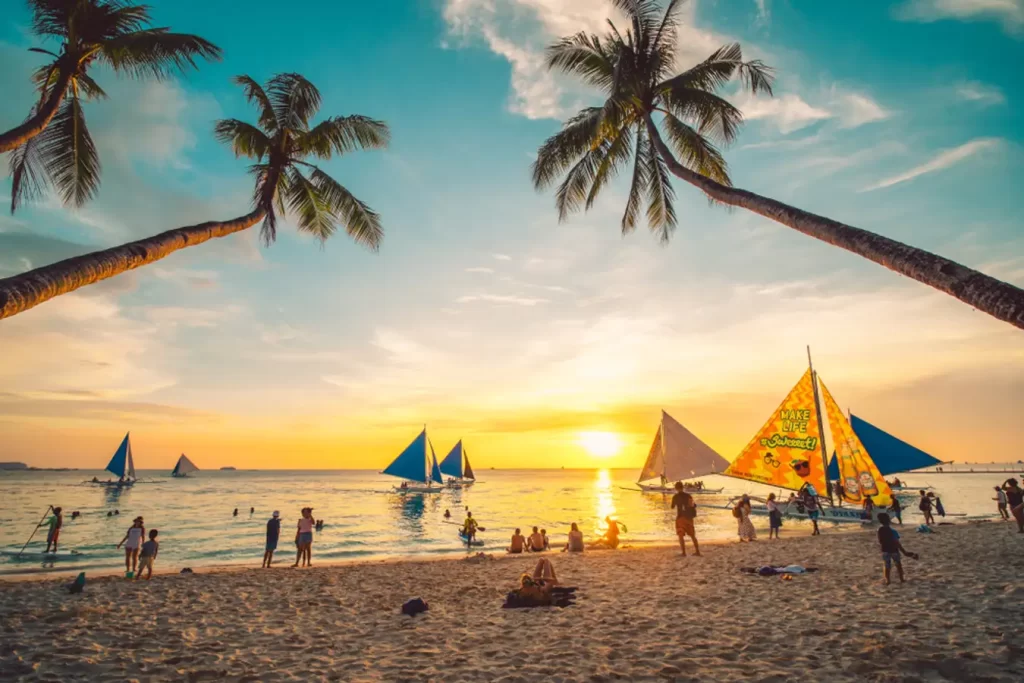
Travel Tips for a Smooth Philippine Adventure
Having highlighted the Philippines’ top attractions, the focus now shifts to some pragmatic advice for a seamless travel experience. From managing expenses and transportation to accommodations and local customs, we’ve got you covered.
Keep in mind, that thorough preparation is the cornerstone of a successful journey. So whether you’re a seasoned traveler or a first-time visitor, our travel tips will help you navigate the Philippines like a pro just remember to bring your mosquito repellent.
Currency and Payment Methods
To start with, we’ll delve into the currency and prevalent payment methods. The local currency in the Philippines is the Philippine peso, and cash is the most commonly used form of payment. However, most major credit cards are also accepted in larger cities and tourist spots.
When it comes to managing your expenses, it’s always a good idea to carry a mix of cash and cards. Tipping is discretionary and often reflects your satisfaction with the service provided. It’s a good practice to have some change available for instances where you choose to tip for good service.
Transportation Options
Getting around the Philippines is quite manageable thanks to its extensive public transportation system. You have a variety of options for short distances, including:
Jeepneys, are known for their colorful decorations and as a cultural icon of the Philippines.
Tricycles, which are great for navigating narrower streets and local neighborhoods.
Buses, offer routes that cover longer distances within cities and provinces.
Ferries, connecting the many islands of the archipelago for inter-island travel.
For longer journeys across the nation, air travel is the quickest and most efficient method. The Philippines hosts several domestic airlines that provide frequent flights linking major cities and sought-after tourist spots. It’s advisable to secure your flight bookings early to take advantage of better rates.
To simplify your travel and ensure a smooth transition from the airport to your destination or hotel, consider booking an airport transfer. This option can offer peace of mind, especially for first-time travelers or those aiming to avoid the hassle of navigating public transport with luggage.
Accommodation Choices
The Philippines offers a wide range of hotel and accommodation options, satisfying various budgets and preferences, all regulated to ensure safety and quality by the government. Whether you’re in search of:
Luxury resorts
Boutique hotels
Budget guesthouses
Hostels
You’re guaranteed to find a place that suits your needs and elevates your travel experience.
Additionally, for a unique lodging experience, consider staying in a traditional Filipino house, known as a “bahay kubo.” Choosing such accommodations not only offers a rich cultural experience but also supports local communities and aligns with government efforts to promote sustainable tourism practices.
Local Customs and Etiquette
Familiarizing yourself with local customs and etiquette plays a vital role in facilitating a respectful and hassle-free travel experience. Filipinos are known for their warm hospitality and congenial temperament, but it’s also important to show respect for their culture and traditions.
When interacting with residents, remember to:
Be polite and considerate
Avoid confrontations and respect personal space
Dress modestly, especially when visiting religious sites or rural areas
Always treat others with kindness and respect
Safety Precautions
On your trip to the Philippines, prioritizing safety is essential. While it is generally safe, it’s prudent to follow basic precautions for a hassle-free journey. First, stay informed about government travel advisories, especially those updated in June, as conditions can vary. Ensure your vaccinations are up to date. Be cautious with your belongings, avoiding ostentatious displays of wealth. Choose your accommodations wisely, opting for hotels with positive security reviews. Lastly, keep emergency contact numbers readily accessible for any unforeseen situations.
Culinary Delights of the Philippines
Your Philippines journey wouldn’t be complete without savoring the country’s culinary offerings. Filipino cuisine is a unique blend of flavors and cooking styles that reflect the country’s rich cultural heritage and diverse natural resources.
From regional specialties and street food favorites to vegetarian and vegan options, the Philippines offers a gastronomic adventure that will tantalize your taste buds and leave you craving for more.
Must-Try Filipino Dishes
The hallmark of Filipino cuisine is its robust flavors and varied ingredients. Whether you’re a foodie or a casual diner, there are certain dishes that you simply must try when visiting the Philippines.
From Adobo, a savory stew made from pork or chicken, to Sinigang, a sour soup made from tamarind and a variety of vegetables, Filipino cuisine offers a wide range of flavors to suit every palate. And don’t forget to try Halo-Halo, a popular dessert made from mixed fruits, sweetened beans, and crushed ice, topped with leche flan and ube ice cream.
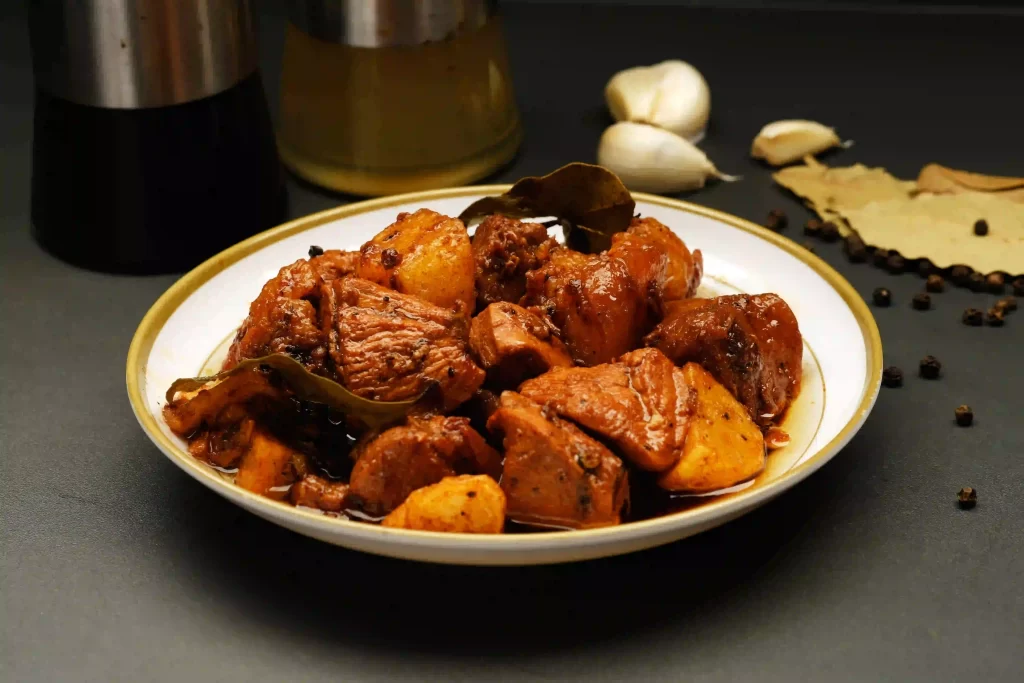
Street Food Culture
To get a real taste of the local cuisine, don’t miss out on the country’s dynamic street food scene. From busy markets to roadside stalls, the Philippines offers a plethora of mouth-watering snacks and dishes that you can enjoy on the go. Make sure to ask the locals to help find those secret spots.
Must-try street foods include:
Fish Balls: deep-fried and served on skewers with a choice of sauces
Kwek-kwek: deep-fried quail eggs coated in a bright orange batter
Balut: a fertilized duck egg that’s boiled and eaten in the shell
For the more adventurous eaters, there’s Balut.
Vegetarian and Vegan Options
Although Filipino cuisine is recognized for its meat-centric dishes, a considerable number of vegetarian and vegan alternatives are also on offer. Many traditional dishes can be made vegan-friendly by substituting meat with tofu or vegetables.
In addition, many plant-based dishes are naturally vegan or vegetarian. These include Pancit, a noodle dish that can be made with a variety of vegetables, and Lumpia, a type of spring roll that can be filled with tofu and vegetables.
Adventure Activities in the Philippines
The Philippines is an adventurer’s paradise, boasting diverse terrains and rich natural wonders. It’s a destination brimming with opportunities for outdoor enthusiasts, featuring activities such as:
Snorkeling: Dive into the crystal-clear waters and explore vibrant coral reefs teeming with marine life. The Philippines is home to some of the world’s most biodiverse underwater ecosystems.
Hiking: Trek through lush rainforests, climb majestic mountains, or traverse scenic trails offering breathtaking views. Each hike promises a unique glimpse into the country’s natural beauty.
Water Sports: From kayaking through serene lakes to surfing on world-class waves, the Philippines offers water sports for every level of thrill-seeker.
Whether you’re drawn to the thrill of adventure or the call of the wild, the Philippines has something to captivate every kind of explorer. So, gear up for an unforgettable journey and dive into the endless adventures that await in the Philippines!
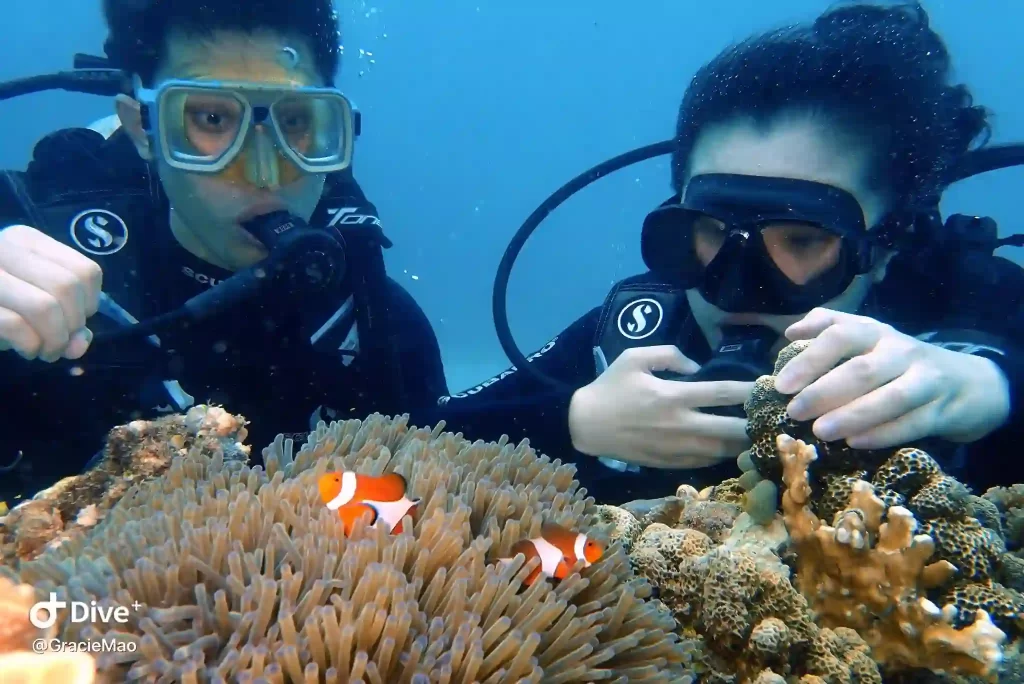
Scuba Diving and Snorkeling
For diving and snorkeling enthusiasts, the Philippines is nothing short of a dream destination. With its rich marine life and clear waters, the nation offers some of the best diving spots in the world.
From the Tubbataha Reefs Natural Park in Palawan, which is a UNESCO World Heritage Site, to the Amos Rock in Tubbataha, divers can explore a variety of underwater landscapes and encounter a diverse range of underwater wildlife.
In addition to these, the Philippines is home to numerous other dive sites that are equally captivating. Anilao in Batangas, for example, is known as the “Nudibranch Capital of the World” for its vibrant and diverse population of these colorful sea slugs. Apo Island, on the other hand, is a protected marine reserve that boasts of a healthy coral reef teeming with a variety of fish species.
For those interested in wreck diving, the sunken World War II ships in Coron Bay offer an eerie yet fascinating underwater exploration. And let’s not forget about Malapascua Island in Cebu, which is one of the few places in the world where you can regularly spot the elusive thresher shark.
Whether you’re a seasoned diver or a beginner looking to get certified, the Philippines provides a range of experiences that cater to different skill levels and preferences. With its warm tropical waters, excellent visibility, and diverse marine ecosystems, it’s no wonder that the Philippines is considered a top diving destination by enthusiasts from around the globe.
Hiking and Trekking
Trekking and hiking enthusiasts can find numerous opportunities for land-based adventures in the Philippines. From easy walks through natural landscapes to challenging mountain treks, there’s a trail for every level of fitness and experience.
Notable hiking destinations include Mount Batulao in Batangas and Mount Pulag in Luzon, both of which offer breathtaking views and a chance to connect with the natural world. Just remember to always respect the environment and follow local regulations to ensure a safe and enjoyable trek.
Water Sports and Island-Hopping
The Philippines serves as a sanctuary for water sports enthusiasts. The country’s pristine waters and favorable weather conditions make it an ideal destination for a variety of water sports, including surfing, kayaking, and stand-up paddleboarding.
In addition, the Philippines is also a great destination for island-hopping. With over 7,000 islands to explore, you can spend your days discovering secluded beaches, snorkeling in vibrant coral reefs, or simply relaxing on the sand. From Palawan to Boracay to Bohol, each island offers its unique attractions and experiences.
Best Time to Visit the Philippines
Choosing the right time for your visit to the Philippines can significantly enrich your travel experience. The nation experiences two main seasons: the dry season from November to April, and the rainy season from June to October.
The best time to visit the Philippines is during the dry season when the weather is most favorable for outdoor activities. However, the country also hosts numerous festivals and events throughout the year, so any time is a good time to experience the vibrant Filipino culture.
Entry Requirements to the Philippines
Before heading to the Philippines in 2024, ensure you’re up to date with the latest entry requirements. Tourists can typically visit visa-free for up to 30 days with a valid passport and return ticket.
For extended stays beyond 30 days, securing a tourist visa is necessary. While the application process is straightforward, always consult the Philippine embassy or consulate in your country for updated policies and requirements. For a comprehensive guide on navigating Philippines entry requirements in 2024, check our detailed blog post, “All You Need to Know About Philippines Entry Requirements in 2024.”
Domestic Airlines
Given the vast expanse of over 7,000 islands, air travel proves to be an efficient and convenient means of exploring the Philippines. Consequently, almost every region boasts an airport, serviced by several domestic airlines that operate regular flights between major cities and popular tourist destinations, including:
Philippine Airlines
AirAsia Philippines
SkyJet Airlines
Swift Air
These airlines provide a convenient mode of transportation across the region or country, simplifying the journey to your chosen destinations.
For booking your flights, consider using Skyscanner to:
- Compare prices and schedules from various airlines.
- Be aware that flight schedules may change due to weather conditions or other unforeseen factors.
- Verify your flight details a few days before your trip to ensure everything is set.

Best SIM Card to Use in the Philippines
Staying connected in the Philippines is straightforward, thanks to a robust mobile network system comparable to those found worldwide. Tourists can choose from multiple SIM card options, provided by carriers that cater to varying data needs with tailored packages.
You can pick up a SIM card upon landing, either at the airport or from authorized retailers in shopping centers and other spots nationwide. Be sure to have a valid ID on hand since registering your SIM card is required for activation. For a comprehensive guide on selecting the best prepaid tourist SIM card for 2024, including top picks and tips, make sure to check our blog.
Expert Travel Tips While Traveling Through The Philippines
Ensure Safety at Night: While the Philippines offers vibrant nightlife and friendly locales, it’s crucial to prioritize safety during nighttime explorations. Stick to well-lit areas, avoid solitary walks on deserted parks, streets, or coastlines, and always inform someone of your whereabouts. Opt for reputable transportation options, especially in unfamiliar areas, to ensure a safe and enjoyable experience after dark.
Optimal Climate for Visits: For the best weather, aim to visit during the dry season, from December to May. This period promises sunny days and minimal rainfall, offering ideal conditions for beach outings, island excursions, and outdoor adventures. The cooler months of December to February are particularly pleasant, providing a comfortable climate for exploring the country’s diverse landscapes and cultural offerings. Starting in June, the weather transitions to the rainy season, which might offer a different experience for those willing to embrace the tropical showers and lush, vibrant greenery that comes with them.
Avoid Drinking Tap Water: Many areas in the Philippines may not meet the water quality standards you’re used to, posing potential health risks. Always choose sealed bottled water for drinking and brushing your teeth. Although many resorts and restaurants use filtered water, it’s advisable to confirm or opt for bottled water to ensure safety.
Pack Smart for the Climate: The tropical climate of the Philippines calls for lightweight, breathable clothing. Rain gear is essential during the wet season from June to November. Don’t forget essentials like sunscreen, insect repellent, and a hat for sun and mosquito protection.
Get Off the Beaten Path: Beyond renowned destinations like Boracay and Palawan, explore hidden gems such as Siquijor or Batanes for a unique experience. These less-explored spots offer a glimpse into the authentic beauty and culture of the Philippines.
Respect Local Customs and Traditions: With a rich tapestry of cultures, understanding and respecting local customs is key. Simple acts of courtesy, like removing shoes before entering a home, demonstrate respect and enrich your travel experience.
Try the Local Cuisine: Filipino cuisine’s mix of flavors is not to be missed. From traditional dishes like adobo and sinigang to the unique street food scene, immerse yourself in the culinary delights. Eating at bustling stalls can ensure freshness and quality.
Bonus Tip: Learn Basic Filipino Phrases: While English is one of the official languages, learning a few basic phrases in Filipino (Tagalog) or the local dialect of the area you’re visiting can enhance your travel experience. Simple words like “Salamat” (Thank you), “Magandang umaga” (Good morning), and “Paalam” (Goodbye) can go a long way in connecting with locals.
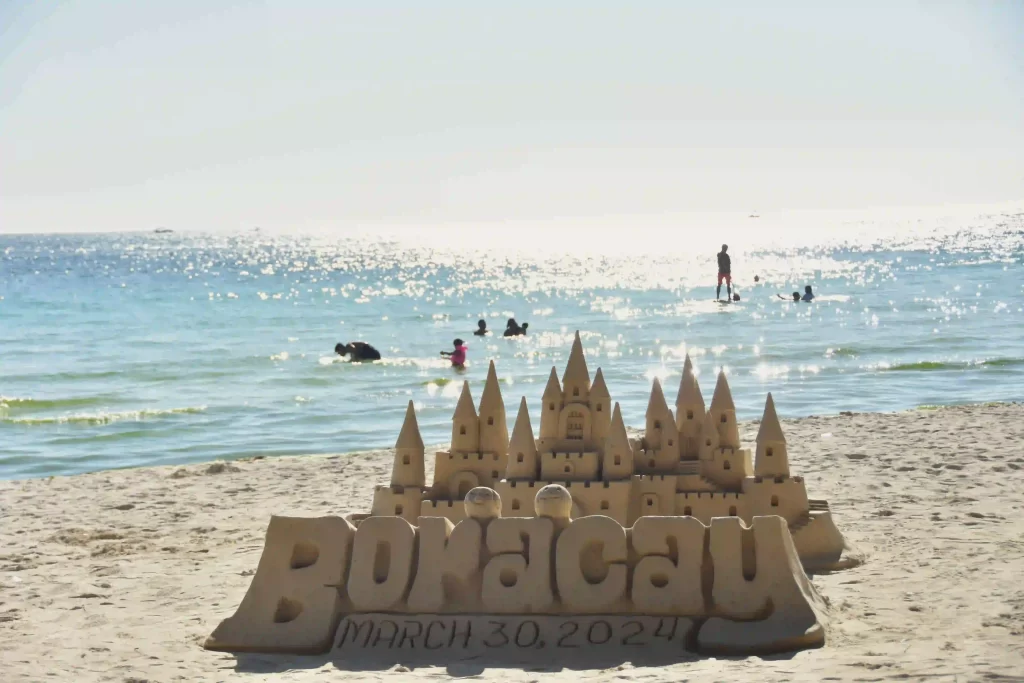
Sustainable Travel in the Philippines
As travelers, showing respect towards the environments and communities we visit is pivotal. This is particularly true in the Philippines, where tourism plays a major role in supporting local economies and preserving natural and cultural heritage.
From staying in eco-friendly accommodations and participating in community-led tours, to practicing leave-no-trace principles and supporting local businesses, there are many ways you can contribute to sustainable tourism in the Philippines. Remember, every small action counts towards making a positive impact.
Travel Recap
In conclusion, the Philippines is a destination that offers a wealth of experiences for every type of traveler. With its rich history, diverse culture, breathtaking natural beauty, and warm hospitality, a trip to the Philippines is sure to leave you with memories that will last a lifetime. So why wait? Start planning your Philippine adventure today!
Frequently Asked Questions (FAQs)
The best time to travel to the Philippines is from December to February, when the temperatures are around 75°F to 88°F, and the country is fully accessible, including its beautiful islands and remote areas. Enjoy your trip!
Non-residents can usually stay visa-free for 30 days. For longer stays, a tourist visa is needed. Check with a Philippine embassy for details and possible extensions.
Visa requirements depend on your country. Many nationals can enter visa-free for 30 days; others need a visa. Always verify current policies before traveling.
Filipinos value hospitality and respect. Be polite, observe traditions, dress modestly at religious sites, and remove shoes when entering homes.
While not mandatory for entry, having travel insurance covering COVID-19 and other medical emergencies is highly recommended for a safer trip.
Domestic flights, ferries, and local transportation options like buses, jeepneys, and tricycles are common. For longer distances, booking flights or ferries in advance is advisable.


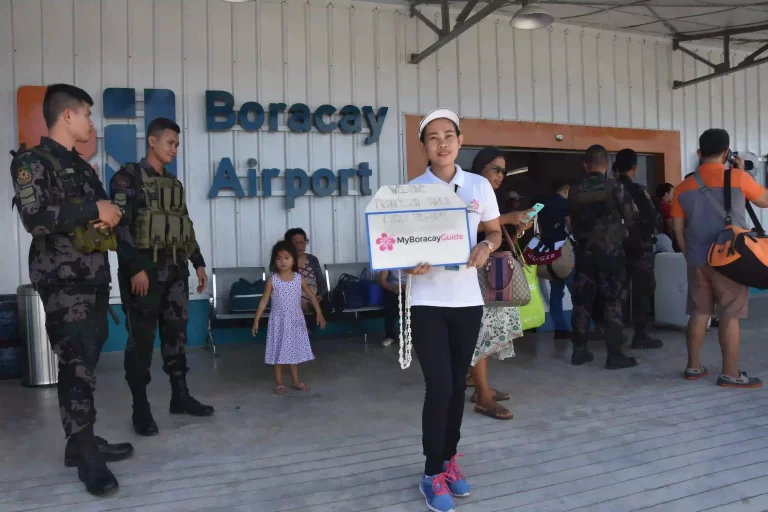
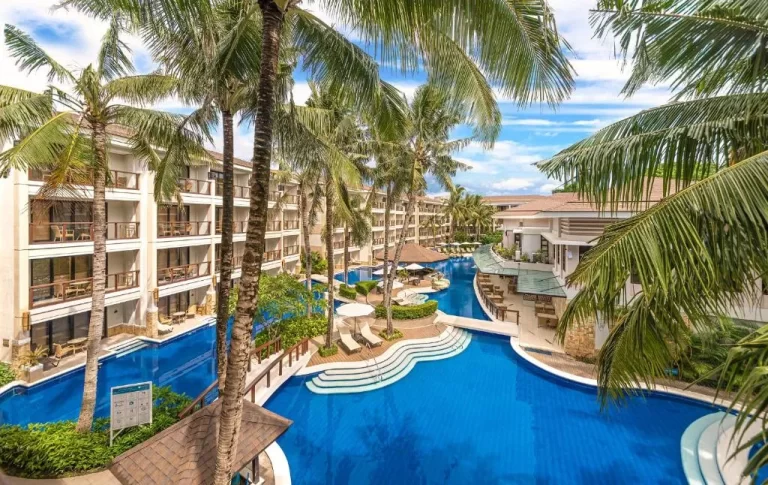
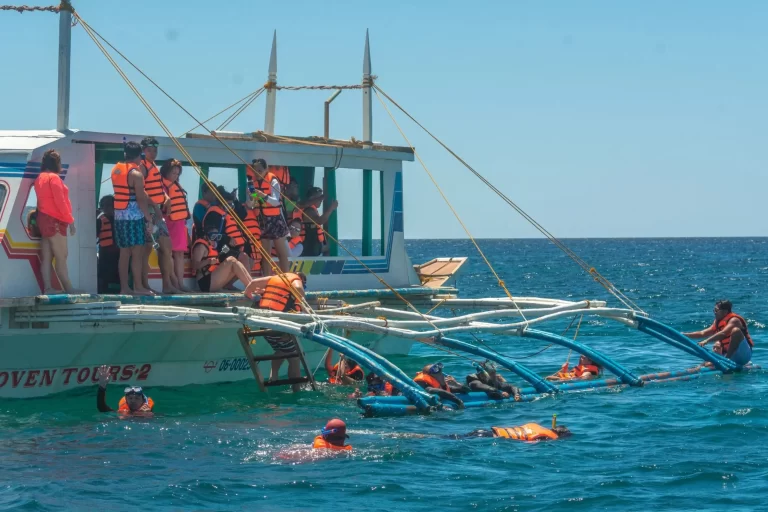

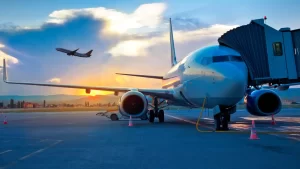

No Comments on Travel to the Philippines: Explore Top Destinations